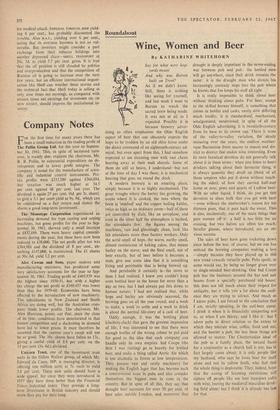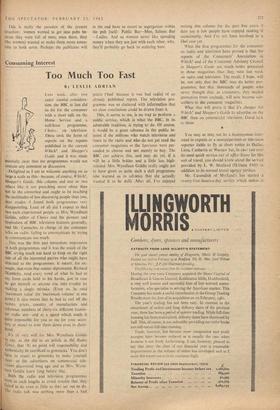Roundabout
Wine, Women and Beer
By KATHARINE WHITEHORN Say for what were hop- yards meant And why was Burton built on Trent?
As if we didn't know. Still, there is nothing like seeing for yourself, and last week I went to Burton to watch the sacred brew being made. It was not at all as I expected. Possibly it is because brewery adver- tising so often emphasises the Olde English aspect of beer that one obscurely expects the hops to be trodden by an old shire horse under the direct command of an eighteenth-century ad- miral; but even apart from this, I had somehow expected to see steaming men with vast chests heaving away at their malt shovels. Some of them do still so heave, I understand—but not at the time of day I was there; it is mechanical heaving that goes on round the clock.
A modern brewery is an amazing place, simply because it is so highly mechanised. The great troughs where the barley lies growing, the ovens where it is cooked, the tuns where the brew is 'mashed' and the copper boiling kettles, twice as high as an ordinary room—half of these are controlled by dials, like an aeroplane, and even in the other half the atmosphere is hushed, the attendants few: the figures among the machines, vast and gleamingly clean, look like lab attendants more than factory workers. Only the acrid smell of hops, the warm, earthy smell, almost reminiscent of baking cakes, that means barley on the move; and the final smell, not of beer exactly, but of beer before it becomes a man, give one some idea that it is something living and perishable that is being brewed up.
And perishable it certainly is—far more so than I had realised. I knew you couldn't keep even bottled beer in the house for more than a day or two, but I had always put this down to human nature; I had not realised that, while hops and barley are obviously seasonal, the brewing goes on all the year round; and a week to make, a week 'to settle and a week to drink is about the normal life-story of a cask of beer.
Oddly enough, it was the bottling plant (clackety-clack) that gave the greatest impression of life; I was interested to see that there were enough bottles of the wrong colour to put paid for good to the idea that each company can handle only its own empties. Ind Coope (the firm I was visiting) go in heavily for bottled beer, and make a thing called Arctic Ale which is too alcoholic to freeze at low temperatures. They possess vast and costly machinery for making the English lager that has become 'such a controversial issue in pubs and also consider themselves the biggest men in cans in the country. But in spite of all this, they say that draught beer accounts for over 50 per cent. of beer sales outside London, and moreover that draught is deeply important in the never-ending war between pub and pub : the bottled men will go anywhere, since their drink remains the same: it is the draught man who directs his increasingly unsteady steps into the pub where he knows that Joe keeps his stuff all right.
It is really impossible to think about beer without thinking about pubs. For beer, except to the skilled brewer himself, is something that comes in bottles and casks, rarely, now differing much locally; it is standardised, mechanised, amalgamated, modernised; in spite of all the Olde English advertising, it is twentieth-century from its base to its crown cap. There is none of the valley-to-valley variation, the steady maturing over the years, the endless weather- vane fluctuation from season to season and dis- trict to district that makes wine interesting. Even its most fanatical devotees do not generally talk about it in these terms: when you listen to beer- drinkers talking about their favourite' thing, it is always quantity they dwell on (think of all those umpires who put it down without touch- ing the sides); of how they carried half-way home or near, pints and quarts of Ludlow beer. With no other liquid, I think, do you get this devotion to sheer bulk that you get with beer —even without the steelworker's reason for his thirteen pints, that it puts back the sweat. This is also, incidentally, one of the main things that puts women off–it: a half is too little for an evening, but two halves are often too much. Smaller glasses, where introduced, are an ob- vious success.
The sales of beer have gone rocketing down since before the war, of course; but no one has noticed the brewing companies making a loss —simply because they have played up to this new trend towards versatile pubs. Pubs spoilt, as some would say, by being no longer given over to single-minded beer-drinking. One Ind Coope pub has the banisters around the bar and oak beams from a specially purchased old house; this does not tell much about their respect for antiquity, but it tells you a lot about the audi- ence they are trying to attract. And much as I adore pubs, I am forced to the conclusion that I am, strictly speaking, in the anti-beer camp. I drink it when it is financially unsporting not to, or when I am thirsty; and I like it: but I adore pubs in direct relation to the extent to which they tolerate wine, coffee, food and me; and the beerier a pub, the less these things are allowed to matter. The Chestertonian ideal of the pub as a family place, the natural focus for a community as a church hall is not, has in fact largely come about; it is only people like my husband, who says he loves beer for itself alone and not its yellow froth, who feel that the whole thing is deplorable. They, indeed, hope that the easing of licensing restrictions will siphon off people like me into transport cafis with wine, leaving the mediaeval masculine drink- ing field alone; but I think it is already too late for that. This is really the paradox of the present situation : women wanted to get into pubs be- cause they were full of men; once there, they (the women) wanted to make them more amen- able to both sexes. Perhaps the publicans will in the end have to resort to segregation within the pub itself: Public Bar—Men, Saloon Bar —Ladies. And as women never like spending money when they are just with each other, why, they'll probably go back to ordering beer.



































 Previous page
Previous page